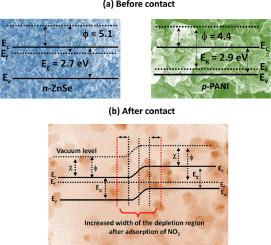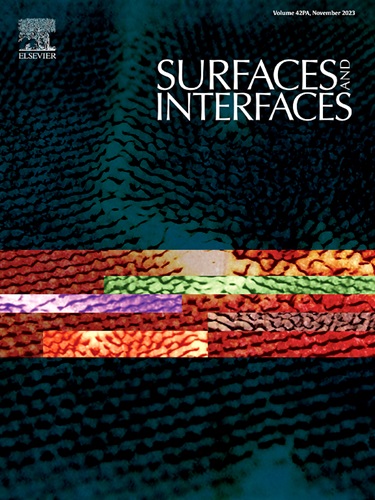Enhanced sensitivity and selectivity of ZnSe/PANI nanocomposite for Low-ppm NO2 detection at room temperature gas sensor application
IF 5.7
2区 材料科学
Q2 CHEMISTRY, PHYSICAL
引用次数: 0
Abstract
The utilization of n-p composite-based gas sensors has garnered substantial interest within the field of gas sensing. This heightened attention can be attributed to the remarkable band alignment of the constituent materials which results in superior charge transfer rate, increased gas interaction sites and reduced optimum operating temperature. In this work, n-ZnSe/p-PANI composites were prepared by simple hydrothermal technique. The obtained X-ray diffraction pattern confirms the phase formation ZnSe, PANI and ZnSe/PANI composites. The pure ZnSe exhibits a sensing performance at a higher operating temperature of 100 °C, whereas ZnSe/PANI composite sample demonstrates an improved sensing response at 30 °C. Notably, the 20 wt.% composite sample (ZnSe–P2) achieved a maximum sensing response of 77 % towards 20 ppm of NO2 gas molecule. Additionally, the sensor exhibits the response time (Tres) of 112 s and recovery time (Trec) of 648 s, at an operating temperature of 30 °C. It also shows better stability, reproducibility and specific selectivity towards NO2 gas molecule. The superior sensing behavior of the ZnSe-P2 sensor can be ascribed to the development of a depletion region in the interface of ZnSe/PANI composites, which improved the charge transfer rate and increased the number of reactive sites. Therefore, the formation of n-p inorganic-organic composite strategy offers an effective approach for detecting NO2 gas molecules at lower temperature of 30 °C.

增强 ZnSe/PANI 纳米复合材料的灵敏度和选择性,用于室温气体传感器中低ppm NO2 的检测
基于 n-p 复合材料的气体传感器在气体传感领域引起了极大的兴趣。这种高度关注可归因于组成材料显著的带排列,从而产生卓越的电荷传输速率、更多的气体相互作用位点和更低的最佳工作温度。本研究采用简单的水热技术制备了 n-ZnSe/p-PANI 复合材料。获得的 X 射线衍射图样证实了 ZnSe、PANI 和 ZnSe/PANI 复合材料的相形成。纯 ZnSe 在 100 ℃ 的较高工作温度下显示出传感性能,而 ZnSe/PANI 复合材料样品在 30 ℃ 下显示出更好的传感响应。值得注意的是,20 wt.% 的复合样品(ZnSe-P2)对 20 ppm 二氧化氮气体分子的最大传感响应为 77%。此外,在 30 °C 的工作温度下,该传感器的响应时间(Tres)为 112 秒,恢复时间(Trec)为 648 秒。它还显示出更好的稳定性、再现性和对二氧化氮气体分子的特定选择性。ZnSe-P2 传感器的优异传感性能可归因于在 ZnSe/PANI 复合材料的界面上形成了一个耗尽区,从而提高了电荷转移速率并增加了反应位点的数量。因此,n-p 无机-有机复合材料的形成策略为在较低温度(30 °C)下检测二氧化氮气体分子提供了一种有效的方法。
本文章由计算机程序翻译,如有差异,请以英文原文为准。
求助全文
约1分钟内获得全文
求助全文
来源期刊

Surfaces and Interfaces
Chemistry-General Chemistry
CiteScore
8.50
自引率
6.50%
发文量
753
审稿时长
35 days
期刊介绍:
The aim of the journal is to provide a respectful outlet for ''sound science'' papers in all research areas on surfaces and interfaces. We define sound science papers as papers that describe new and well-executed research, but that do not necessarily provide brand new insights or are merely a description of research results.
Surfaces and Interfaces publishes research papers in all fields of surface science which may not always find the right home on first submission to our Elsevier sister journals (Applied Surface, Surface and Coatings Technology, Thin Solid Films)
 求助内容:
求助内容: 应助结果提醒方式:
应助结果提醒方式:


